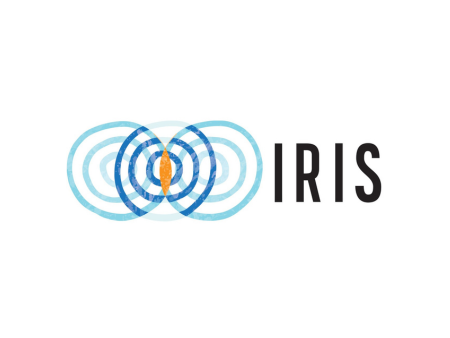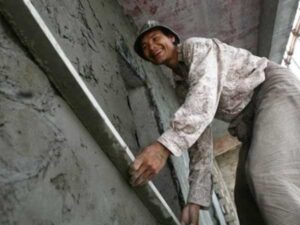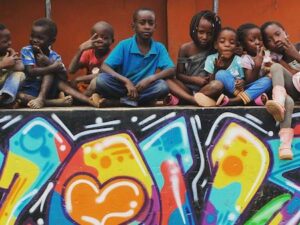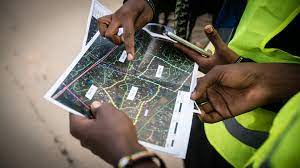International Resource for Impact and Storytelling works with funders and civil society leaders to strengthen and support networks and initiatives that initiate new conversations and collaborations between independent storytellers and journalists and community-based movements, informed by narrative strategies.
Cara Mertes of International Resource for Impact and Storytelling spoke with Alec Saelens on April 25, 2024. Click here to read the full conversation with insights highlighted.
Alec Saelens: I’d like to ask you to introduce yourself and say more about your organization. What do you do, and what are the beneficiaries that you are supporting through this work?
Cara Mertes: I’m the founder and director of something called IRIS, which is the International Resource for Impact and Storytelling; a sponsored initiative of RPA [Rockefeller Philanthropy Advisors]. We’re not our own 501C-3 organization, and we intend to stay that way, so that we can put all of our energy into the work itself as opposed to building an institution that is more permanent. That takes a lot of time and energy.
This initiative works internationally at the intersection of narrative change, narrative analysis, what I call storytelling for impact, which is essentially community-rooted storytelling, and civic innovators, which includes both movement leaders and, crucially, entrepreneurs. I’ve been a partner with Skoll now through three different positions that I’ve had. I started working with Skoll Foundation at Sundance when I was running the documentary program. I partnered with Skoll when I was at Ford Foundation on an innovation and impact fund for storytellers. Now, at IRIS, I’m a narrative partner with Skoll Foundation working to bring research together with developing a very diverse pipeline for Skoll Foundation and the Skoll World Forum, and also developing innovative content for impact.
Alec Saelens: What is the problem that you’re addressing with this organization, and how are you responding to that problem?
Cara Mertes: IRIS is really a response to what I’ve learned over the last couple of decades of work. Thinking about how to position artists as leaders in society, thinking about how to validate narrative research and the importance of understanding our meaning-making functions, for which narrative shift and narrative research is a shorthand–the ways in which humans make meaning of the world around them. Philanthropy in particular has a crucial role to play as an incubator, a model-setter, a gap-filler in terms of things that the marketplace will not support. That kind of innovation is something that is sorely needed right now as we are presented with complex problems that humans have never faced before. That combination of artistry, creativity, innovation, and meaning-making is something that has not been funded and supported in the ways that it needs to be for those who are working for greater justice, greater equity.
Those that are working to consolidate power have actually done an incredibly effective job changing narratives and studying how narratives and culture lead not just in policy-setting but in policy consistency–maintaining policies, as opposed to getting the win and then seeing a backlash. They’ve been very adept at taking a very long view and creating the conditions for power to be consolidated and for the kinds of laws and regulations that make sure that that continues to happen. We need an equivalent amount of support and understanding, and what I think of as narrative and story for impact fluency, for those that are working to redistribute power as opposed to consolidate power. These are the two differences that I see at a very basic level. What are social entrepreneurs, innovators, or creators trying to do? We’re actually trying to reflect a complex world where power is distributed.
Alec Saelens: Could you give an example of the type of stakeholder that you work with and how they have achieved that objective of using narrative to provide a counter to some of the forces that are a consolidating power in ways that could be adverse to some of the larger goals of social change?
Cara Mertes: I could go right to the six narrative experts that we hosted at the Skoll World Forum this year. In terms of how they are using narrative, each of them does it differently. I created a cohort that comes from different parts of the world; therefore they’re working in different contexts. They have different major problems that they’re trying to address, and yet all of them in some way, shape, or form are looking at this question of meaning-making and shifting narratives. Recreating a new kind of common is another way to think about it. We have Helena Nassif, who’s working in the MENA region, and what she does is birth cultural organizations. She creates networks. First she creates and builds capacity for new cultural organizations, then she builds networks for them, so that in the MENA region they actually have cohorts that can work together. That’s a cultural angle that she’s taking.
Paula Miraglia comes out of Brazil and Latin America. She’s a journalist, so her narrative shifting is through rethinking the future of independent journalism, and its function for providing information and also maintaining and changing narratives, putting new narratives out in the world. She’s looking at the question of free speech and rights, as well as survival in this time of collapse of the business model of journalism.
Mehret Mandefro is a trained doctor, physician, and anthropologist, and she’s a filmmaker. She raises up stories from parts of the world and from perspectives that are not usually platformed in this way. I can keep going down the list, but if you look at each of the six, you will see a different angle into ways that you can think about the cultural strategy [of] narrative shifting, with building out community power as a core part of the approach, regardless of the genre or the type of organization.
Alec Saelens: What do you think is distinct about the work that you’re doing at IRIS compared to what other organizations in this space are attempting to do? What’s your niche?
Cara Mertes: We’ve heard from a number of people that there really isn’t any other initiative like IRIS right now. The narrative-shift and culture-shift ecosystem has been in formation for quite some time and is more developed in the US, and to a certain extent in the UK, than it is in other places. But most of these initiatives and organizations are US-focused. IRIS is explicitly global-majority focused, not exclusively, but primarily, and then very interested in connecting the international conversation back to the US, the UK and Europe, but not as a one-way street. In fact, it’s positioning global majority knowledge and strategies and approaches as [lessons] for the US and the West, broadly speaking. That is an innovation.
We’ve looked very closely at other organizations that exist and precisely designed IRIS not to be duplicative. As a funder at Ford Foundation, I was involved with the launch and development of a number of these organizations. So I have a fair amount of familiarity with the culture-change space and the narrative-research or narrative-strategy space. We’re providing resources like a narrative directory–that hasn’t been done before. It’s intended to be a global gathering of information that’s owned by the larger field and populated by it for those organizations and individuals that consider themselves narrative change-makers.
We have started a conference called Confluence, which is the first-ever global-majority-focused gathering of narrative practitioners and narrative expertise at the center of the conference, not at the periphery. We held the first one last October, 2023 in Bogotá. We intend to do two more, one in MENA and probably one in East Africa. Then we’ll see if it takes on a life of its own and becomes a gathering place for those people that are working across the different sectors that are finding the work that IRIS and others that are adjacent to us are doing.
The third thing that we do is put artists and content creators at the center of the work that we’re doing, unlike a lot of other strategies where academia puts research and data at the center. We want to see a combination of the artists and creators [with] community voices. Then that’s placed at the center of any approaches, any strategies that we design with donors. We currently have nine donor partners that come to us sometimes for very specific things, sometimes just general support, because they see us as a valuable node in this growing narrative ecosystem.
Alec Saelens: How do you measure the success of your work, and what kinds of evidence do you collect to assess whether you’re making progress and whether it’s in the right direction?
Cara Mertes: There’s qualitative and quantitative. The quantitative, the numbers, the people involved, all of those kinds of things, that’s one pretty traditional form of assessment. But we’re very interested in validating a set of qualitative indicators that start with the voices of people that have been most impacted by the work that we’ve been doing. We ask for interviews with people that have participated in the work that we have done, and we make that a central component. We call that framework “story as evidence.”
I think if IRIS continues doing its work and can lay a claim to fame at the end of the original 10 years that we’re envisioning, it will be that we have contributed something with staying power that validates qualitative assessments in the cultural realm. We need to borrow from other fields, and we need to remix and rematch and break away from the linear numbers approach that philanthropy rests on and introduce a suite of measurement tools that talk about things like trust, wisdom, leadership, resiliency, and community.
Alec Saelens: What’s your theory of systems change in your fields? What are the levers of systems change that you’re trying to pull in your work?
Cara Mertes: I spent many, many years running film funds and funding single films. Long-form documentary is my particular background and contribution. That theory of change was predicated on the notion of if you have enough voices and enough perspectives represented, documentary is a non-commercial way to do it, it’s a very effective way to do it, and it’s relatively affordable. If you think about the difference between feature films and documentaries, documentaries become possible for many, many more people. The idea is that if you make sure that you have a large variety of perspectives that are consistently being represented, that over time there will be a shift in attitudes, values, and beliefs, right? I have to say over this 20-plus year career, we’ve seen a complete undermining of the values that we might be thinking will lead to greater justice and greater equity. I had to question the idea that if you fund enough films as single films, that in aggregate they will actually have some impact. They do in certain ways at certain times, and we have seen some victories, but we’ve also seen tremendous rollback.
For me, narrative change is systems change. It’s dropping a level below the individual film projects and really looking at the function of meaning-making, being much more fluent in how that works, and beginning to fund organizations and networks of organizations and networks of people that are thinking very strategically about this, so that we have an equivalent capacity to those who are interested in consolidating and power and maintaining that power. We need an equivalent capacity. For me, at the narrative level, if you combine that with the storytelling and with strengthening this in civil society leadership overall, in concert with litigation, with policy research, with some of the other forms of advocacy and with movement leadership and movement building, then you have a virtuous cycle. If you add in the meaning-making function, then you get a much more powerful engine for change.
Alec Saelens: What are the challenges that you’re facing? Let’s leave aside funding, which is a common issue. What are the main roadblocks that you’re facing doing this work of achieving a focus on meaning-making at systems level? How do you try to overcome those?
Cara Mertes: One of the biggest challenges is that we are charting new territory. Even though I’m working with some of the most qualified people in the narrative and storytelling space and in philanthropy. Our function is to bridge philanthropic leadership with this new space to build capacity. But we don’t have a lot of examples in front of us. We don’t have a lot of roadmaps for how to do this in a way that doesn’t replicate the approaches of those who are consolidating power, using fear and divisiveness. We don’t want to replicate that in our use of narrative strategies or storytelling strategies. How do we take the same toolset and not be divisive and not try and drive people’s behavior through raising fears as opposed to connectedness, for instance? But somehow it doesn’t feel like the change is at hand, so people begin to doubt that that is the way forward. That is also a big challenge: getting people to understand the power of this work and the consistency of the outcomes, but over a longer arc of time than people are used to thinking about.
People think in election cycles, they think in annual cycles, maybe they think in five-year strategic planning cycles, but they don’t think in terms of generational change. They don’t think about deeper narratives that are embedded at almost an unconscious level that are driving entire populations. We don’t tend to think in those terms, and certainly not in philanthropy, which is very much driven by these much shorter timeframes and budgeting cycles.
The biggest challenge is to understand what really works. As you’re building it out in these relatively early days of doing this, you have to do a lot of experimenting, and you also need a lot of trust with your partners so that you can pivot and adjust as you go.
The second-biggest challenge is that the speed of change, the rate of change, and the density of change now in everybody’s life today is unimaginable. If we just think about the advent of AI, just that, and obviously climate and all of the other effects that we’re seeing, it’s compounding, it’s growing faster and faster. That is a huge, huge challenge for everybody working in these spaces.
Alec Saelens: Thank you so much for your time. I really appreciate you sharing your thoughts.
Click here to read the full conversation with insights highlighted.
Alec Saelens is a former journalist who supports SJN and its partners track solutions journalism’s impact on society and the industry. In his former role, he researched and consulted on the connection between solutions journalism and revenue. He is co-founder of The Bristol Cable, the UK’s pioneering local media cooperative. Before SJN, he was a researcher and coach for the Membership Puzzle Project and an analyst for NewsGuard.
* This interview has been edited and condensed.
Read about other social innovations centered around storytelling.







